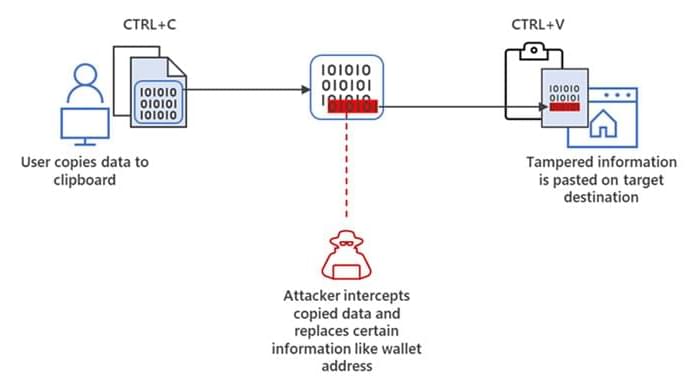The sunrise SpaceX Starlink launch included dazzling views of the sun and moon.
A stunning SpaceX Starlink satellite fleet launch on May 18 included amazing views of the moon and sunrise.



Microsoft warns of “cryware” malware that steals information and exfiltrate data directly from non-custodial cryptocurrency wallets.
Microsoft is warning of an emerging threat targeting internet-connected cryptocurrency wallets, signaling a departure in the use of digital coins in cyberattacks.
The tech giant dubbed the new threat “cryware,” with the attacks resulting in the irreversible theft of virtual currencies by means of fraudulent transfers to an adversary-controlled wallet.
“Cryware are information stealers that collect and exfiltrate data directly from non-custodial cryptocurrency wallets, also known as hot wallets,” Berman Enconado and Laurie Kirk of the Microsoft 365 Defender Research Team said in a new report.

Len RosenFalcon 9 has been a spectacular success for SpaceX. The purpose of the Falcon Heavy is likely to be superseded by Starship which likely means the Heavy will be discontinued sooner than later.
Eric KlienAuthor.
Len Rosen Actually, Starship will rapidly grab all of the Falcon 9 payloads, except for humans which will be much slower to transition. In fact, it looks like the first orbital Starship launch will try to launch some Starlink satellites.
View 1 more reply.
Len Rosen shared a link.
No one should think we are over COVID.
The reason the Falcon Heavy hasn’t flown in about 3 years is that the Falcon 9 ended up having about twice the capacity that was planned for and so the Falcon 9 took away many missions from the Falcon Heavy. (There will finally be some more Falcon Heavy missions later this year…)
Anyway, SpaceX has again increased the capacity of the Falcon 9. They have changed certain timings during flight like igniting the MVac engine a few seconds earlier than on other missions and are separating the fairing closer to stage separation to shed dead weight earlier in the flight.
Additionally, SpaceX is loading propellants on the rocket at slightly lower temperatures than usual in order to pack more of them into the tanks and increase the amount of Starlink satellites the Falcon 9 can put into orbit.
SpaceX has launched its twentieth Falcon 9 rocket of the year with a batch of Starlink satellites to Low Earth Orbit (LEO) on the Starlink Group 4–15 mission. Liftoff occurred on Saturday, May 14 at 4:40:50pm EDT (20:40:50 UTC) from Space Launch Complex 40 (SLC-40) at Cape Canaveral Space Force Station (CCSFS) in Florida.
The Falcon 9 for this mission was of special interest as it uses a new booster, B1073-1, something not seen until now on a Starlink mission.



Two SpaceX Falcon 9 rockets have completed back-to-back Starlink launches less than 24 hours apart, successfully delivering 106 Starlink satellites to low Earth orbit (LEO).
Originally scheduled just a handful of hours apart, slight delays eventually saw Starlink 4–13 and Starlink 4–15 settle on 6:07 pm EDT, May 13th and 4:40 pm EDT, May 14th, respectively. Entering the final stretch, launch preparations went smoothly and both Falcon 9 rockets ultimately lifted off without a hitch.
The series began with Starlink 4–13 on Friday. SpaceX chose Falcon 9 B1063 to support the Starlink launch and the booster did its job well, wrapping up its fifth launch since November 2020 with a rare landing aboard drone ship Of Course I Still Love You (OCISLY). Since SpaceX permanently transferred OCISLY from the East Coast to the West Coast in mid-2021, the drone ship has only supported five booster recoveries. Save for an unusual East Coast Starlink launch in May 2021, Falcon 9 B1061 has also primarily been tasked with supporting SpaceX’s West Coast launch manifest. With only one older pad – Vandenberg Space Force Base’s (VSFB) SLC-4 complex – available to SpaceX, the company’s West Coast Falcon launches are also considerably rarer than its East Coast missions.

Crafty hackers can make a tool to eavesdrop on some 6G wireless signals in as little as five minutes using office paper, an inkjet printer, a metallic foil transfer and a laminator.
The wireless security hack was discovered by engineering researchers from Rice University and Brown University, who will present their findings and demonstrate the attack this week in San Antonio at ACM WiSec 2022, the Association for Computing Machinery’s annual conference on security and privacy in wireless and mobile networks.
“Awareness of a future threat is the first step to counter that threat,” said study co-author Edward Knightly, Rice’s Sheafor-Lindsay Professor of Electrical and Computer Engineering. “The frequencies that are vulnerable to this attack aren’t in use yet, but they are coming and we need to be prepared.”

In a ghastly vision of a future cut off from sunlight, the machine overloads in the Matrix movie series turned to sleeping human bodies as sources of electricity. If they’d had sunlight, algae would undoubtedly have been the better choice.
Engineers from the University of Cambridge in the UK have run a microprocessor for more than six months using nothing more than the current generated by a common species of cyanobacteria. The method is intended to provide power for vast swarms of electronic devices.
“The growing Internet of Things needs an increasing amount of power, and we think this will have to come from systems that can generate energy, rather than simply store it like batteries,” says Christopher Howe, a biochemist and (we assume) non-mechanical human.